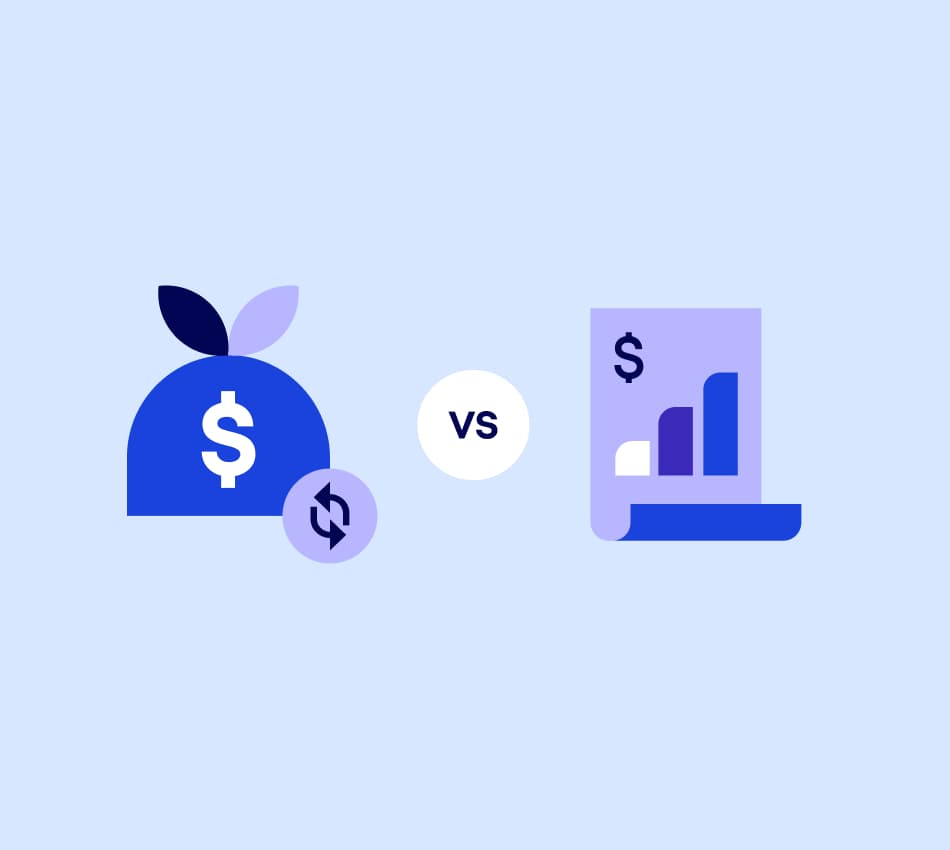There are two main ways to fund your small business via a financial institution: a term loan (also called an installment loan), or a business line of credit. Either of these can be used for short-term or long-term financing. In this article, we’ll define loans and lines of credit, and outline the pros and cons of each.
What you need to know
- Term loans and business lines of credit are common ways to acquire funding for your small
business. - Term loans are for a set amount and have a fixed interest rate, while lines of credit have variable interest rates and can be drawn in increments.
- If you manage them properly, both will positively impact your business credit score.
What is a term loan?
Term loans are lump-sum loans repaid in fixed installments over a term. This type of business debt financing can be guaranteed by collateral (secured business loan) or not (unsecured term loan). The average repayment term is three-to-six years, repaid monthly.
| Pros of business term loans | Cons of business term loans |
| Predictable repayments | No repayment flexibility |
| Fixed interest rate | Longer approval process |
| Longer loan term | Interest costs can be high over time |
Interest rates on term loans are typically fixed, so your monthly installment payments are all the same amount. The repayment terms in loan agreements state how much the payments will be and how long you need to make payments. The agreement should also include any fees you pay on the loan, including penalties for late payments.
Before you sign a loan agreement, your lender will give you an amortization schedule that breaks down how much of each monthly repayment goes to interest and how much goes to the principal. Some lenders charge a fee if you try to pay the loan off early, so check for this and other fees before signing. Note that the average loan length can vary and it’s important to understand when your loan is set to end.
What is a line of credit?
A business line of credit (LOC) is a revolving loan with a variable interest rate, from which you can take what you need up to a certain amount.
| Pros of business credit lines | Cons of business credit lines |
| Flexibility | Variable interest rates |
| Pay interest only on what you use | May come with maintenance fees |
| Quick and easy access to funds | Easier to overuse than a term loan |
Flexibility is the main feature of a line of credit—you pay interest only on what you draw. Keep in mind that the interest rate you pay changes when the prime rate changes. If rates go up, lines of credit will charge higher interest.
Quick and easy access to funds comes in handy if you need a cash infusion, but it can also tempt you to take more than you need. Avoid that by drawing only when necessary and documenting how you spend each draw. It’s also important to separate your business finances from your personal finances.
Is a term loan or line of credit better for my business?
The main difference between business loans and business credit lines is structural: fixed-rate lump-sum borrowing versus variable-rate flexible funding. Consider what you need the money for, as certain projects require an upfront investment, while others have milestones due over time. Here are some scenarios where term loans and business lines of credit could be useful.
What term loans are good for
Here are some of the different types of term loans you should consider as a business owner:
- Capital loans to fund a new business or reinvest in an existing business.
- Equipment loans to buy new office furniture or computers.
- Real estate loans, or mortgages, to buy property.
You can also consider an SBA loan, which is a term loan guaranteed by the U.S. Small Business Administration that you can receive through local banks or credit unions. Depending on your business credit and your revenue, you may be able to borrow up to $50 million. The terms and conditions favor small business owners looking to grow and scale their operations.
What lines of credit are good for
Flexible funding is ideal when your cash flow needs are variable, like for seasonal businesses or in the leadup to a product launch or expansion. Because you can repay your draws any time, these loans are a good way to maintain liquidity.
How do term loans or lines of credit impact my business credit score?
The business credit bureaus (Experian, Equifax, and Dun & Bradstreet) keep track of the amount of debt you take on and how you manage it, so getting approved for a term loan or line of credit can affect your business credit score. Late repayments will reduce your business credit score, so manage your debt responsibly.
By making consistent, on-time repayments toward your business loan or line of credit, you can build your business credit score over time and set yourself up for future financing opportunities—not to mention more favorable terms on future business loans.
What are the business loan application process and requirements like?
The application process and requirements will vary between lenders. For best results, gather your financial records, personal and business identification information, and your business plan. Read the lender’s guidelines carefully and tailor your answers to meet those guidelines.
Some factors that lenders might consider include your personal and business credit scores, how long you’ve been in business, your revenue, and your other debt obligations. If you’ve got a solid credit history, steady revenue, and a low debt-to-income ratio, your business may have a good chance of being approved for a loan.
Explore business financing opportunities that fit your needs.
